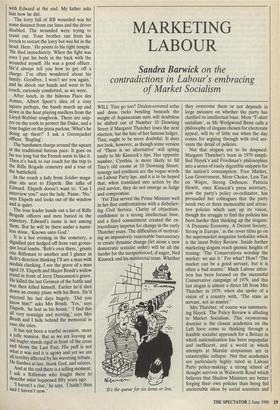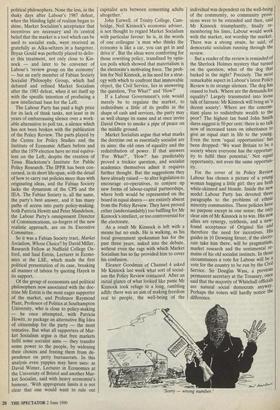MARKETING LAB OUR
Sandra Barwick on the
contradictions in Labour's embracing of Market Socialism
WILL Tina go too? Dralon-covered sofas and dress racks bending beneath the weight of Aquascutum suits will doubtless be shifted out of Number 10 Downing Street if Margaret Thatcher loses the next election, but the fate of her famous lodger, Tina, ought to be more doubtful. It does not look, however, as though some version of 'There is no alternative' will spring easily to Mr Kinnock's lips. Her opposite number, Cynthia, is more likely to fill Tina's old rooms at 10 Downing Street: synergy and synthesis are the vogue words on Labour Party lips, and it is to be hoped that, when translated into action by the civil service, they do not emerge as fudge and compromise. Yet Tina served the Prime Minister well in her first confrontations with a disbeliev- ing Civil Service. Clarity of objectives, confidence in a strong intellectual base, and a fixed commitment created the ex- traordinary impetus for change in the early Thatcher years. The difficulties of motivat- ing an impassively reasonable bureaucracy to create dynamic change (let alone a new democratic socialist order) will be all the harder for the inexperienced, if eager, Neil Kinnock and his ministerial team. Whether `It's the queue for six items or less.' they overcome them or not depends in large measure on whether the party has clarified its intellectual base. Mere 'T—shirt socialism', as Mr Wedgwood Benn calls a philosophy of slogans chosen for electorate appeal, will be of little use when the day comes for arguing through with civil ser- vants the detail of policies.
Not that slogans are to be despised: Margaret Thatcher's team in 1979 simpli- fied Hayek's and Friedman's philosophies into a series of easily digestible snippets for the nation's consumption: Free Market, Less Government, More Choice, Less Tax on Wages, Strong Defences. Patricia Hewitt, once Kinnock's press secretary, now the party's policy co-ordinator, has persuaded her colleagues that the party needs two or three memorable and attrac- tive policies which sum up its vision, though the struggle to find the policies has been harder than thinking up the slogans: `A Dynamic Economy, A Decent Society, Strong in Europe,' as the cover titles go on the supermarket magazine lookalike which is the latest Policy Review. Inside further marketing slogans reach gnomic heights of teasing: 'The Conservatives worship the market: we use it.' For what? How? 'The market can be a good servant, but it is often a bad master.' Much Labour atten- tion has been focused on the successful Conservative campaign of 1979, and this last slogan is almost a direct lift from Mrs Thatcher in 1979, when she spoke of a vision of a country with, 'The state as servant, not as master.'
Mrs Thatcher, of course was summaris- ing Hayek. The Policy Review is alluding to Market Socialism. This oxymoronic doctrine is the closest academics on the Left have come to thinking through a feasible socialist approach for a Britain in which nationalisation has been unpopular and inefficient, and a world in which attempts at Marxist utopianism are in catastrophic collapse. Not that academics are particularly highly rated in Labour Party policy-making: a strong school of thought survives in Walworth Road which believes that Shadow Ministers are better forging their own policies than being fed unelectable ideas by social scientists and political philosophers. None the less, in the shaky days after Labour's 1987 defeat, when the blinding light of realism began to shine, Market Socialism's acceptance that incentives are necessary and its central belief that the market is a tool which can be used to socialist ends, were received as gratefully as Alka-seltzers in a hangover. Bryan Gould was perfectly placed to deliv- er this treatment, not only close to Kin- nock — and later to be convener of Labour's 'review group on the economy' — but an early member of Fabian Society Socialist Philosophy Group, which had debated and refined Market Socialism after the 1983 defeat, when it set itself up with the specific intention of producing a new intellectual base for the Left.
The Labour Party has paid a high price for its lack of think tanks, not least in its years of embarrassing silence over a work- able alternative to poll tax, a silence which has not been broken with the publication of the Policy Review. The parts played by the Centre for Policy Studies and the Institute of Economic Affairs before and after the 1979 election have no real equiva- lent on the Left, despite the creation of Tessa Blackstone's Institute for Public Policy Research. The IPPR has been con- cerned, in its short life-span, with the detail of how to carry out policies more than with originating ideas, and the Fabian Society lacks the dynamism of the CPS and the IEA. The Fabian Society is, all the same, the party's best answer, and it has many paths of access into party policy-making: both Patricia Hewitt and Peter Mandelson, the Labour Party's omnipresent Director of Communications, co-forgers of the new realistic approach, are on its Executive Committee.
So it was a Fabian Society tract, Market Socialism, Whose Choice? by David Miller, Research Fellow at Nuffield College Ox- ford, and Saul Estrin, Lecturer in Econo- mics at the LSE, which made the first political presentation of its case, breaking all manner of taboos by quoting Hayek in its support.
Of the group of economists and political philosophers now associated with the doc- trine Mr Estrin is the most eager supporter of the market, and Professor Raymond Plant, Professor of Politics at Southampton University, who is close to policy-making — he once attempted, with Patricia Hewitt, to package an alternative Big Idea of citizenship for the party — the most tentative. But what all supporters of Mar- ket Socialism argue is that free markets fulfil some socialist aims — they transfer some power to the people, by widening their choices and freeing them from de- pendence on petty bureaucrats. In this analysis even yuppies may have uses: as David Winter, Lecturer in Economics at the University of Bristol and another Mar- ket Socialist, said with heavy economist's humour, 'With appropriate limits it is not clear that one would want to rule out capitalist acts between consenting adults altogether.'
John Eatwell, of Trinity College, Cam- bridge, Neil Kinnock's economic adviser, is not thought to regard Market Socialism with particular favour: he is, in the words of one colleague 'a man who thinks the economy is like a car, you can get in and drive it'. But the ideas were comforting for those rewriting policy, transfixed by opin- ion polls which showed that materialism is the electorate's motivating force. The prob- lem for Neil Kinnock, in his need for a strat- egy with which to confront that immovable object, the Civil Service, lies in answering the question, 'For What?' and 'How?'
If a Labour Government's role would merely be to regulate the market, to redistribute a little of its profits in the shape of cash and services, the party may as well change its name and at once invite David Owen to smoke a pipe of peace on the middle ground.
Market Socialists argue that what marks the doctrine out as essentially socialist are its aims: the old ones of equality and the redistribution of power. If that answers `For What?', 'How?' has predictably proved a trickier question, and socialist academics themselves admit it requires further thought. But the suggestions they have already raised — to alter legislation to encourage co-operatives, to conjure up new forms of labour-capital partnerships, where both would be represented on the board in equal shares — are entirely absent from the Policy Review. They have proved either (understandably) too baffling for Mr Kinnock's intellect, or too controversial for the electorate.
As a result Mr Kinnock is left with a means but no ends. He is walking, as his local government spokesman has for the past three years, naked into the debate, without even the rags with which Market Socialism has so far provided him to cover his confusion.
Eleanor Goodman of Channel 4 asked Mr Kinnock last week what sort of social- ism the Policy Review contained. After an initial glance of what looked like panic Mr Kinnock took refuge in a long, rambling adlib: there was an aim of making freedom real to people, the well-being of the individual was dependent on the well-being of the community, so community provi- sions were to be extended and then, said Mr Kinnock triumphantly, finally re- membering his lines, Labour would work with the market, not worship the market. There was a strong strain, he said, of democratic socialism running through the review.
But a reader of the review is reminded of the Sherlock Holmes mystery that turned on the question, what of the dog that barked in the night? Precisely. The most remarkable aspect in Labour's latest Policy Review is its strange silences. The dog has ceased to bark. Where are the demands for equality? Largely transmuted into loose talk of fairness: Mr Kinnock will bring us 'a decent society'. Where are the concom- itant plans to redistribute wealth to the poor? The highest tax band John Smith dares suggest is 50 per cent: there is no talk now of increased taxes on inheritance to give an equal start in life to the young. Even the term 'equal opportunities' has been dropped: 'We want Britain to be a society where everyone has the opportun- ity to fulfil their potential.' Not equal opportunity, not even the same opportun- ity.
For the cover of its Policy Review Labour has chosen a picture of a young woman hugging a little girl: they are both white-skinned and blonde. Inside the new model Labour Party has devoted three paragraphs to the problems of ethnic minority communities. These policies have no purpose except in one sense; the only clear aim of Mr Kinnock is to win. His new allies are synergy, synthesis, and a new- found acceptance of Original Sin and therefore the need for incentives. His guides in 10 Downing Street, if the electo- rate take him there, will be pragmatism, market research and the sentimental re- mains of his old socialist instincts. In those circumstances a vote for Labour will be vote for the country to be run by the Civil Service. Sir Douglas Wass, a previous permanent secretary at the Treasury, once said that the majority of Whitehall officials are natural social democrats anyway. Perhaps the voters will hardly notice the difference.
`Sorry — wrong number.'



















































 Previous page
Previous page